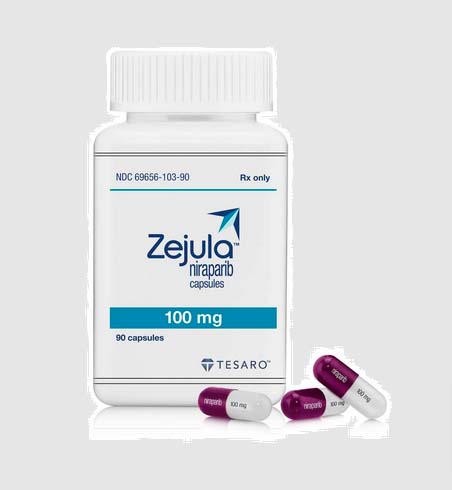
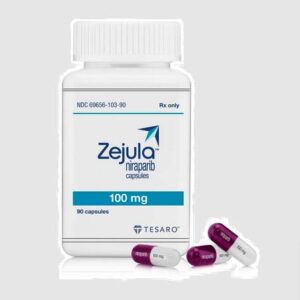
Buy Zejula (niraparib) Online
From $5,017.10
DISEASE INDICATIONS: Gynaecological Cancer
MANUFACTURER: Tesaro UK Limited
USAGE: Oral
MEDICINE APPROVED BY:
European Medical Agency (EMA)
Food and Drug Administration (FDA)
Health Canada
Therapeutic Goods Administration (TGA)
Zejula (niraparib) is a drug used for the maintenance treatment of recurrent epithelial ovarian, fallopian tube, or primary peritoneal cancer in adult patients who have responded to platinum-based chemotherapy.
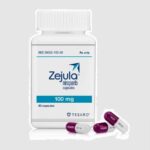
Buy Zejula (niraparib) Online
From $5,017.10
- Description
- Additional information
- Reviews (0)
Description
What is Zejula (niraparib) for?
Zejula (niraparib) is a prescription medication used to treat specific types of ovarian cancer. It is indicated for the maintenance treatment of adult patients with recurrent epithelial ovarian, fallopian tube, or primary peritoneal cancer who are in complete or partial response to platinum-based chemotherapy. It is also used to treat advanced ovarian, fallopian tube, or peritoneal cancer in patients who have received at least three prior chemotherapy regimens and whose cancer has responded to their most recent chemotherapy treatment. Zejula is a PARP inhibitor, a targeted therapy that stops cancer cells from repairing their DNA, causing them to die.
How does Zejula (niraparib) work?
Zejula (niraparib) is a PARP (poly ADP-ribose polymerase) inhibitor. PARP enzymes play a crucial role in repairing cells damaged by chemotherapy, but cancer cells also use them to repair damaged DNA. Inhibiting PARP enzymes prevents cancer cells from repairing their DNA, causing them to die. Zejula specifically targets cancer cells that have mutations in their BRCA genes, as these cells are more reliant on PARP enzymes for DNA repair. By inhibiting PARP activity, Zejula prompts cancer cells to die, which slows or halts tumor growth.
How is Zejula (niraparib) taken?
Zejula (niraparib) is available in oral capsule form. The recommended dose is 300 milligrams, once daily, taken with or without food. Patients should continue taking Zejula until disease progression or unacceptable toxicity occurs. Dosage adjustment may be necessary based on a patient’s individual response and adverse effects. Patients should report any side effects to their healthcare provider immediately. It is essential to take Zejula exactly as prescribed by a healthcare provider and not to change the dosage or stop the medication without first consulting a doctor.
Are there any known side effects of Zejula (niraparib)?
Yes, there are known side effects of Zejula (niraparib). The most common side effects include fatigue, nausea, vomiting, constipation, abdominal pain or discomfort, decreased appetite, diarrhea, indigestion, bloating, high blood pressure, headache, dizziness, trouble sleeping, and changes in the way things taste.
Other less common side effects may include anemia, decreased platelet count (thrombocytopenia), reduced white blood cell count (neutropenia), and increased creatinine levels.
Patients taking Zejula may also experience serious side effects, such as myelodysplastic syndrome or acute myeloid leukemia, which is characterized by abnormal cells in the blood and bone marrow.
Patients should report any side effects to their healthcare provider immediately. It is essential to take Zejula exactly as prescribed by a healthcare provider and not to change the dosage or stop the medication without first consulting a doctor.
Clinical trials
Zejula (niraparib) has been approved by the Food and Drug Administration (FDA) in the USA and the European Medical Agency (EMA) in the European Union as a maintenance treatment for adult patients with recurrent epithelial ovarian, fallopian tube, or primary peritoneal cancer who have responded to platinum-based chemotherapy. This approval was based on a double-blind, placebo-controlled study called ENGOT-OV16/NOVA. The study enrolled 533 patients with platinum-sensitive recurrent epithelial ovarian, fallopian tube, or primary peritoneal cancer who had received at least two prior platinum-containing regimens and were responding to their current platinum-based regimen. Patients were divided into two groups based on the detection of BRCA gene mutations. The first group, the germline BRCA mutated (gBRCAmut) cohort, consisted of 203 patients, while the second group, the non-gBRCAmut cohort, consisted of 350 patients.
The primary efficacy outcome measure of the study was progression-free survival (PFS). The results showed that patients who received niraparib had a significant improvement in PFS compared to those who received a placebo. The gBRCAmut cohort had a PFS of 21.0 months (95% CI: 12.9, not reached) with niraparib, while the placebo group had a PFS of 5.5 months (95% CI: 3.8, 7.2). The non-gBRCAmut cohort had a PFS of 9.3 months (95% CI: 7.2, 11.2) with niraparib, while the placebo group had a PFS of 3.9 months (95% CI: 3.7, 5.5).
Additional information
| Package | 56 capsules of 100 mg, 84 capsules of 100 mg |
|---|
Be the first to review “Buy Zejula (niraparib) Online” Cancel reply
Related Products
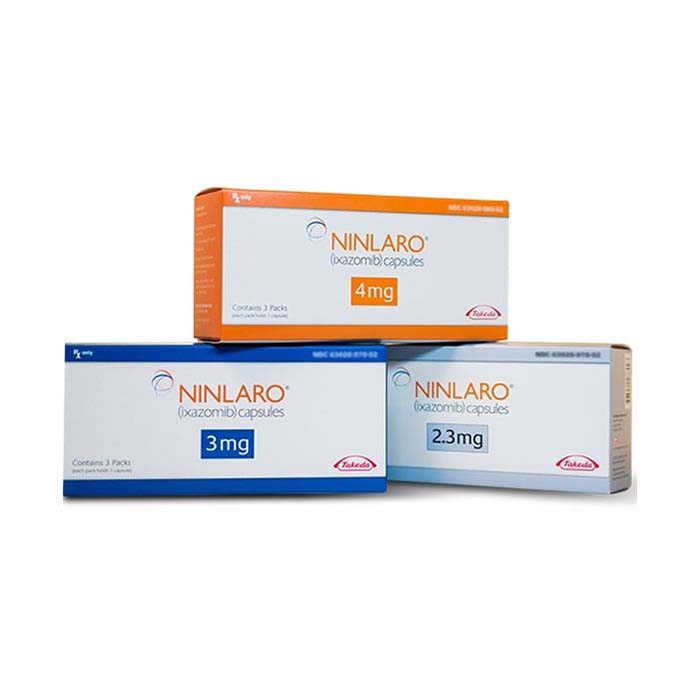
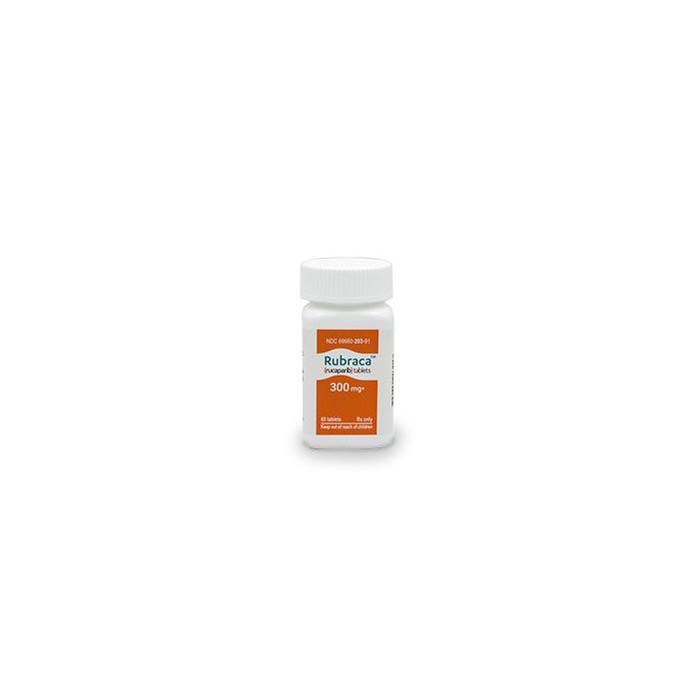


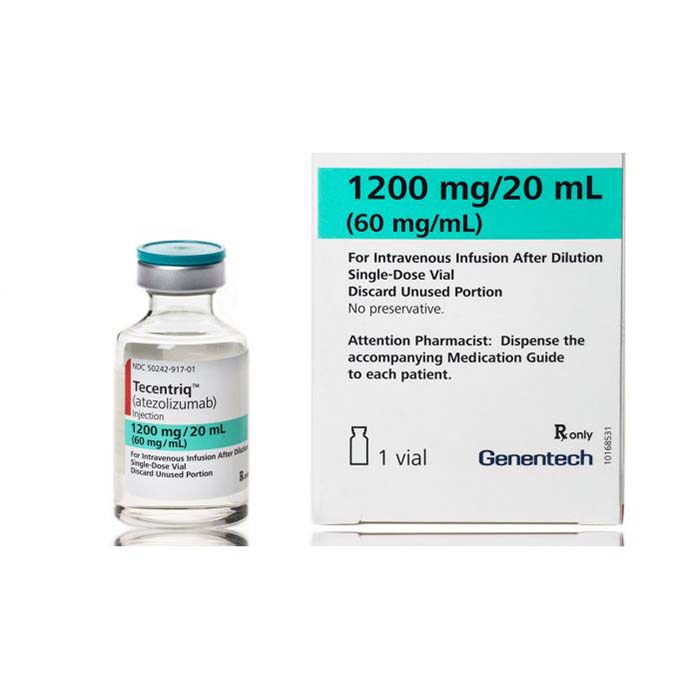


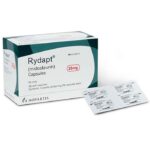
Reviews
There are no reviews yet.